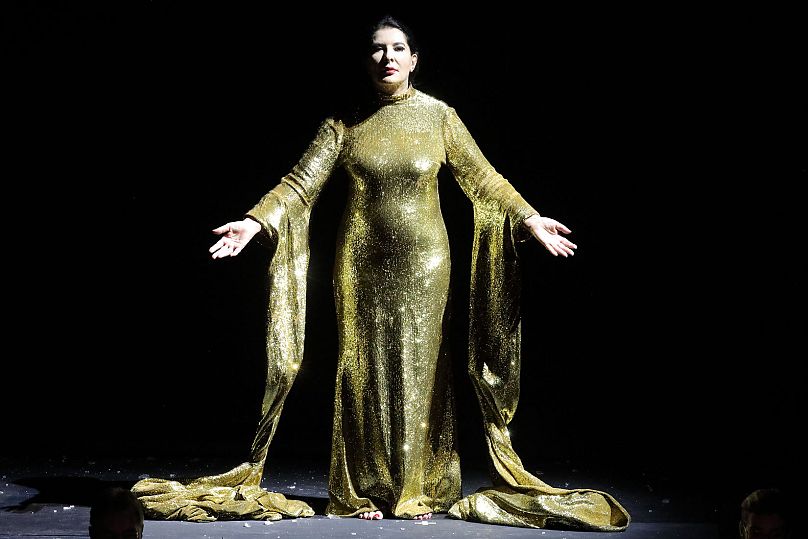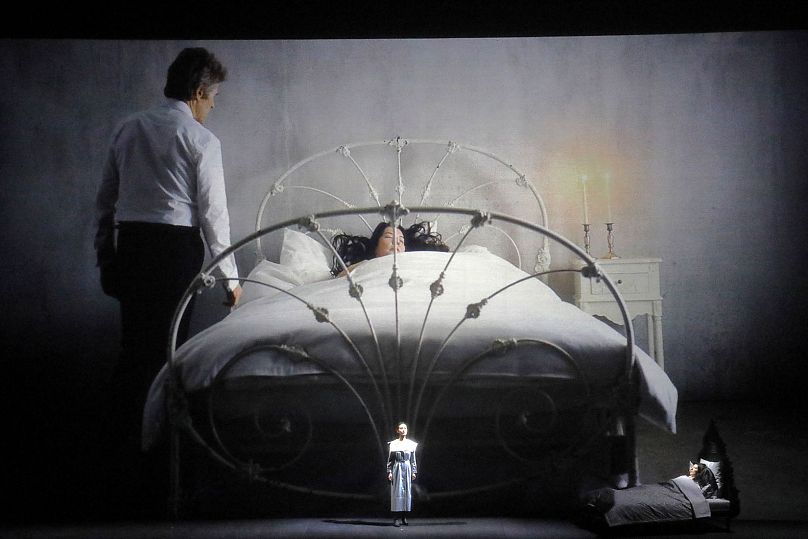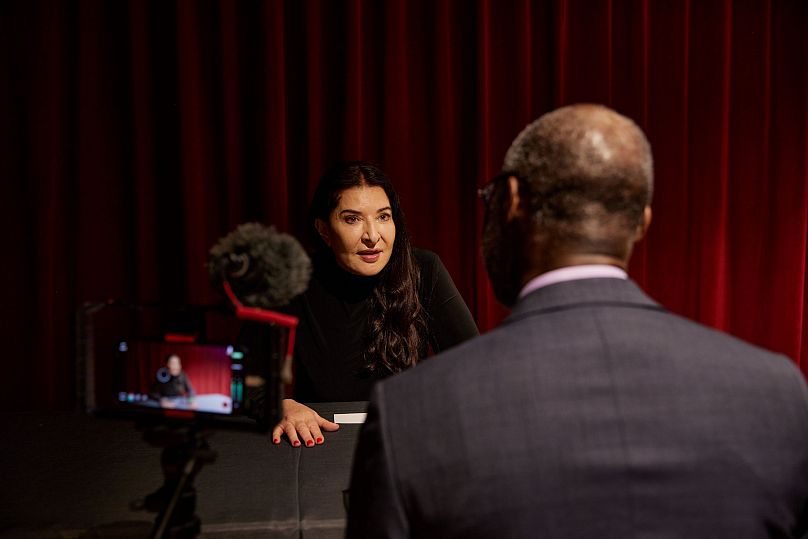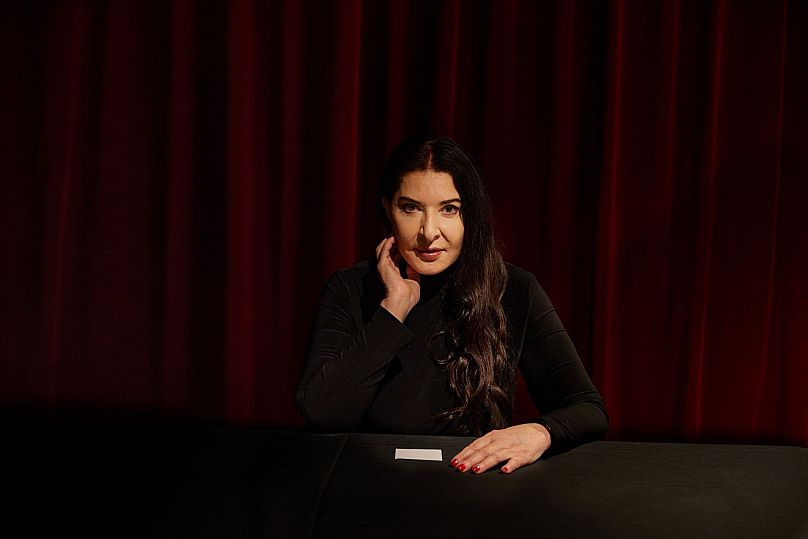Women's History Month - Marina Abramović: My life as a performance artist
Marina Abramović has a very special relationship with Spain. The country and its culture reflect she says so much of how she feels and what she represents. So, when asked to perform and direct by Barcelona's famed Liceu Opera, Abramović says the unique opportunity was too good to miss.
Over a five-decade-long career, Marina Abramović has earned acclaim across the globe as a leading pioneer of performance art. She's famous for consistently testing the limits of her own mental and physical endurance throughout her work – and inviting audiences to follow her on the process.
 ADVERTISEMENT
ADVERTISEMENT
 ADVERTISEMENT
ADVERTISEMENT
The Serbian artist has made a huge impact on the art world with spectacular works, including 1974's Rhythm 0, when Abramović invited audiences to interact with her using one of 72 objects on a table in front of her at a Naples event space. While people started tamely - offering her a rose or a kiss - the six hour performance ended with a loaded gun held to her head.
Later works including 2010's The Artist Is Present, held at the Museum of Modern Art in New York, encouraged spectators to question their own emotions while they sat in silence opposite Abramović, for more than 700 hours. In 2014, she used herself and the public as medium while she performed for three months at London's Serpentine Gallery, in a piece she called 512 Hours after the duration of the work.
Marina Abramović will be back in the UK capital from September to December this year at the Royal Academy, after having her show postponed twice due to the COVID-19 pandemic. Remarkably, she will become the first woman ever to have a dedicated solo show in the Academy's Main Galleries.
To conclude Euronews Culture's Women's History Month coverage, we caught up with Abramović recently at Barcelona's Liceu Opera Theatre where she was starring and directing her nomadic project The 7 Deaths of Maria Callas.
Euronews Culture: What can audiences expect from this show?
Marina Abramović: So it's very particular show. Normally opera is 4 or 5 hours long. But this opera is only one hour and 30 minutes, because I'm actually only playing the dying scenes.
When you come to opera, you're waiting for this amazing ending and the crescendo. I just kind of took everything else out and we only show the dying. But in this case, you can see some of this – it’s Tosca, Madame Butterfly, it’s Carmen, and all of them are dying and dying and dying. But there is also the secret that we don't talk about in the title - this is Maria Callas, which I'm playing myself.
Also in the performance is Willem Dafoe, a Hollywood A-lister. What's it like to work with him and how did you manage to attract him to work on this?
He's only on the video because the whole idea that this opera is a mixture of film performances to which we add real acting. So he actually is killing me seven times on the video, which we filmed in Hollywood.
This is very big part of the opera context. It's not just the background. It's actually the subject of the opera itself. And he's a great killer. He's a great actor, too. And in the mind of Callas, emotionally, she was killed by Onassis because he broke her heart. And then because of broken heart, she died. And this is all the subject of opera. I took him as actually playing Onassis over and over again.
There's more than a passing resemblance between you and Maria Callas. Why did you choose this, of all the things, to direct?
First of all, if somebody told me ten days or ten years ago that I will do opera, I tell them ‘You're crazy’, because I'm pretty radical performance artist and I will never do opera. Opera is such a really old-fashioned form of art. But I was thinking, let's do something new, something unexpected and something nobody expected me to do. Let's take the opera and make some kind of new mix. And I'm also interested that this opera normally always attracts a certain age of people to see it. But what about the young generation? My work is very much seen by younger audiences and I want to give them something in opera that they actually could access. Normally they will never go to opera, but they will come to see mine, which really happened. And I'm very happy about this. And this was the reason to put a new dress in opera.
You've had incredible success as a performance artist for more than 50 years and you once said that you were prepared to die for your art. Do you still feel that same way?
Always, yes. I've done some performances that I could really easily die for, because, I like this. Bruce Nauman, the very good American artist said that art is a question of life and death. Maybe that sounds melodramatic, but it's very true. And I really take this as a kind of idea for my work because I think that whatever you do, you have to be ready to die for what you believe in. And for me, it's art. And in opera, I metaphorically die. I'm not dying really. But I’ve done some works in my life that actually I could let the audience kill me. And I’m lucky that I’m still here.
This performance coincides with International Women's Day and Women's History Month. What does that mean to you?
International Woman Day is wonderful to celebrate in communist countries. We always celebrate. But I really remember this communist dance in the communist countries, like a very sad day because basically what will happen is that women will go to the hairdressers, go for a manicure, a pedicure, and will look beautiful. They would cook entire lunches and men will come with the flowers, eat the lunch, and then the men will go to celebrate in the evening by themselves and the women will stay home. I remember it as this kind of disaster.
But anyway, I think it's important today to celebrate. But at the same time, I always have to say to the public that it’s all fine. I'm not a feminist artist because I don't believe that art has an agenda. Art can just be art. It doesn't matter who's doing it. So it's a kind of contradiction for me, you know? I am a woman, but I make art which doesn't have a gender. But I have to say that next year I am invited to a very important conference in Lithuania, and I supposed to address the crowd in a basketball stadium of 10,000 women. I just signed a contract to do that. And this is a huge challenge. I’ve never done 10,000 people. I’ve done about six thousand but not ten. So this is an enormous trust and respect, and I'm really looking forward to it. It’s a big deal.
Another landmark for you coming up this year is your show - you're going to be the first woman to have a display at Britain's Royal Academy. Can you tell us a little bit about that?
That's kind of amazing. 255 years and there’s never been a woman in the space of the Royal Academy. I'm the first one. So I really want to do my best. And also for that occasion, I'm organising a very special Tea Party only for women who are successful in politics, in science, technology, writers, filmmakers, artists, and we're just going to really have time together. This is the first time I'm doing such a thing. It's going to be in London, and I will play my opera there too, in the National Opera. And I'm also presenting the artists in my institute, the young artist presenting their work.
So there will be so many events during that period in London. And it's a very, very big moment in my career. I'm actually showing different subjects in my work and they're not done in any way chronologically but mixing different periods.
So much is being said these nowadays about how artificial intelligence could affect art. Do you see it as something to be celebrated or condemned?
My relation to technology in life is one of love and hate at the same time. I understand why it is good, but I also understand that technology has completely taken away our freedom and free time, because we actually could have free time if we used it wisely. But we don't, because we are addicted to technology.
My whole approach to this is to go back to simplicity, to find a way to use technology, but to also have time. For my performances, I ask everyone to put their watch, their computer, their telephone away and just surrender to the experience without taking photographs before you even see something. This is very important. My work is deeply emotional. And for that, you have to be in the present. In the space and time when it's happening. You have to be here and now.
You were recently in Spain to receive the prestigious Princess of Asturias award. Do you think there is something that particularly resonates about your work in this country?
Oh, definitely. For me, that award was an incredible surprise and an incredible honour to receive. I reach a large audience and I really bring emotions to them and that's really the core of it - you are there to lift the human spirit. And this is what I really aim to do, because it's so easy to put the human spirit down. We need this, especially in time we live now, which is such a difficult time. Not just the war in Ukraine, but also global warming and where we are emotionally. I’ve come from New York, Los Angeles, San Francisco, and we have more than a million people homeless on the street, in the richest part of the planet. It's just unacceptable. So all of this, you have to find a way to give optimism, give oxygen to society and to lift spirits. It’s the main aim of my work. The Asturias award really reflected that, and I was incredibly happy to get it. Also because Spain is so passionate, and I am so passionate about everything. I’m Balkan - we write drama and we are passionate about life and we enjoy life. And the Spanish public understands my work. This is why this opera has the right audience at the right time and in the right place.
So many people look up to you and what you've done in terms of your performances. But who do you look up to? Who do you find inspiring?
I’m always inspired by nature. To me nature is a big inspiration. People always ask me which artists inspired me and I have to disappoint them because I need to go to source. The source for music, running rivers and mountains and water and hugging the trees. That nature and energy is such a kind of vitality. So that's a really big inspiration. And then, go to solitude and go into isolation and then ideas come out from nowhere. Mostly I take ideas that I'm afraid of, difficult ideas, and I have to really do that and go with those ideas. I never do anything that I like – it’s too easy.
Looking back at all that you've done, with all the shows where you've literally put your life on the line… Here you're directing an opera… It makes me wonder: What are you afraid of now beyond this?
There’s always something to be afraid of. I have to tell you this really nice story. When I was in my twenties, fresh from art academy, we made this trip with the bus from Belgrade. It was incredible. Strenuous hours and hours and days to come here to Barcelona. I think this was in the sixties at the time. And I went to see Columbus’ boat with which he actually discovered America and it was unbelievable that it was such a small boat. And that was something that I have never forgotten - the story of Columbus at that time, when they thought the Earth was square and that you could actually fall from the square.
The Queen sent Columbus to discover new ways to get spices from India, and nobody wanted to go on this trip. Only convicts from the prison were given to him. And they went to this tiny little island, and there, they had their last dinner on that island, which, in my imagination, must have been something incredibly special, because next up was a trip going to unknown. They're going to the possibility of falling from the Earth. There was so much more courage in this than going to the moon, because they had all this technology. But falling from the Earth…
This was something in my mind as a child that was incredible. And I was thinking: Oh my God, this is what my world is about. I need to imagine that every time I do something new that I'm going to fall from the Earth… And then, oops, you find a way to America. Or you have failure, and you really fall. So this was the Columbus dream state in my mind.
Watch the video above for more on our interview with Marina Abramović's and her performance at Barcelona's Liceu Opera.














